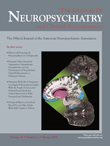Modafinil-Induced Reversible Hyperkinetic Nondystonic Movement Disorder in a Patient With Major Depressive Disorder
SIR: Fatigue, lack of energy, and lassitude are commonly reported symptoms in major depressive disorder and are likely to persist as residual conditions in patients with partial response to antidepressant therapy. Modafinil, a newer psychostimulant, has been used as an augmentation strategy to treat persistent fatigue and sleepiness in patients with major depression who are partial responders to antidepressant treatment. 1 Furthermore, modafinil may fasten the onset and degree of resolution of symptoms of depression with fatigue when combined with selective serotonin reuptake inhibitor treatment. 2 Modafinil seems to be generally well tolerated; frequent adverse events include headaches, nausea and nervousness, which are transient in most cases.
Case Report
A 76-year-old female patient with a history of major depressive disorder (DSM-IV), was admitted to the psychiatric department with a severe major depressive episode (Hamilton Depression Rating Scale) in August 2003. After partial response with venlafaxine 150 mg/d and concomitant treatment with zopiclone 7.5 mg/d for insomnia, she still suffered from severe lack of energy, persistent fatigue and lassitude. Modafinil 200 mg/d was then administered as augmentation to ongoing antidepressant therapy with rapid improvement of residual symptoms and full remission from depression after 2 weeks of treatment (Hamilton Depression Rating Scale). The patient was discharged with venlafaxine 150 mg/d and modafinil 200 mg/d and subsequently was followed at our outpatient clinic. After 4 months of continuous treatment, the patient presented with bothersome, nondystonic, hyperkinetic, involuntary movements affecting the orofacial region and the lower limbs, which had developed over the past 4 days. After discontinuation of modafinil, the drug-induced movement disorder improved and then finally disappeared completely within 4 days.
Comment
The authors report a case of a severe and disabling, but reversible, orofacial and lower limb hyperkinetic, nondystonic, modafinil-induced movement disorder. No such movement disorders have been observed in patients treated with modafinil for daytime sleepiness or narcolepsy even in large-scale trials. 3 Neither have there been any reports on those disorders in depressed patients receiving modafinil as an augmentation strategy. A causal relationship between the intake of modafinil and the movement disorder described seems probable, because the movement disorder developed within a timeframe of 4 months of continuous treatment with modafinil, which is in line with a case report on orofacial dyskinesias following a 10-month period of treatment with the modafinil derivative adrafinil. 4 Furthermore, the movement disorder completely resolved within 4 days after discontinuation of modafinil. This case report supports further evidence that, like in the case of antipsychotics, 5 elderly patients might have a greater risk for developing hyperkinetic movement disorders.
1. Fava M, Thase ME, DeBattista C: A multicenter, placebo-controlled study of modafinil augmentation in partial responders to selective serotonin reuptake inhibitors with persistent fatigue and sleepiness. J Clin Psychiatry 2005; 66:85–93Google Scholar
2. Ninan PT, Hassman HA, Glass SJ, et al: Adjunctive modafinil at initiation of treatment with a selective serotonin reuptake inhibitor enhances the degree and onset of therapeutic effects in patients with major depressive disorder and fatigue. J Clin Psychiatry 2004; 65:414–420Google Scholar
3. US Modafinil Multicenter Study Group: Randomized trial of modafinil as a treatment for the excessive daytime somnolence of narcolepsy. Neurology 2000; 54(5): 1166–1175Google Scholar
4. Thobois S, Xie J, Mollion H, et al: Adrafinil-induced orofacial dyskinesia. Mov Disord 2004 Aug; 19(8):965–966Google Scholar
5. Kane JM, Woerner M, Lieberman J: Tardive dyskinesia: prevalence, incidence, and risk factors. Psychopharmacology (Berl) Suppl 1985; 2:72–78Google Scholar



